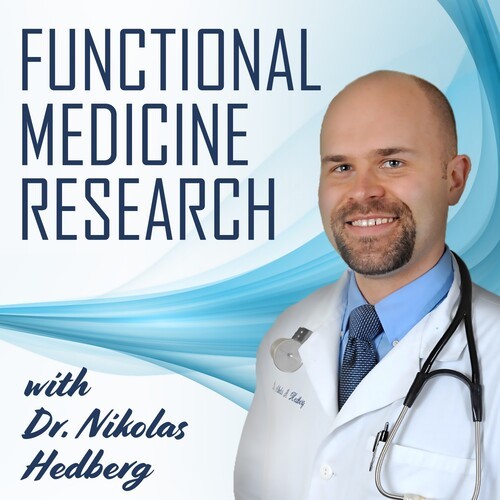
Vagus Nerve Impairment and Long COVID-19
Functional Medicine Research with Dr. Nikolas Hedberg, DC
Episode · 0 Play
Episode · 9:04 · Jun 9, 2022
About
A new paper entitled, “Impaired Vagal Activity in Long-COVID-19 Patients” sheds light on the vagus nerve’s involvement in Long-COVID-19. COVID-19 is divided into three phases of infection: 1. “Acute COVID-19” (signs and symptoms of COVID-19 infection up to 4 weeks). 2. “Ongoing symptomatic COVID-19” (from 4 weeks up to 12 weeks). 3. “Post-COVID-19 syndrome” (signs and symptoms persist beyond 12 weeks). Click here to learn more about the Hedberg Institute Membership. Study Methods 30 Long-COVID-19 patients were compared to 20 control subjects who never had COVID-19. 21 patients were classified based on their experience while having COVID-19 as mild/moderate and 9 as severe/critical. 7 patients had no/negligible functional limitations, 6 had slight functional limitations, and 17 had moderate/severe functional limitations. No significant differences were found among study subjects and controls regarding gender, demographics, medical history, drug use, and vital signs. However, previous studies have shown that females are more affected by Long-COVID-19. Heart rate variability was measured through ECG. Heart rate variability parameters are controlled by the parasympathetic nervous system. The sympathetic nervous system promotes inflammation through catecholamines and beta-adrenergic stimulation in contrast to the parasympathetic nervous system which is anti-inflammatory. COVID-19 causes an imbalance between these two systems, thus driving inflammation and a procoagulative state. Study Findings Heart rate variability was found to be lower in the Long-COVID-19 patients. Left ventricular ejection fraction was lower in Long-COVID-19 patients. When SARS-CoV-2 comes into contact with the eye, it may reach the central nervous system via the trigeminal nerve. And when the virus contacts the nasal mucosa, it may reach the brain through the olfactory nerve. It may also travel to the central nervous system via the vagus nerve from the respiratory system, the heart, the digestive system, the kidneys, bladder, uterus, and testicles. This occurs through neuronal retrograde transport to the axonal terminal. SARS-CoV-2 has been detected in the vagus nerve, thus persistent damage to this nerve could explain impairment of the parasympathetic nervous system in Long-COVID-19 patients. SARS-CoV-2 can also invade the brain through a dysfunctional blood-brain barrier, which has been damaged by cytokine storm. SARS-CoV-2 binds to the ACE2 receptor found in the respiratory airway, lung, vascular endothelia, kidney cells, and small intestine. ACE2 receptors are also found in neurons and glia in the brainstem regions responsible for cardiovascular function and regulation. SARS-CoV-2 neuronal invasion drives epinephrine and norepinephrine from the adrenal gland known as the “catecholamine surge” which causes cardiovascular, lung, and brain injury. NT-proBNP levels were found to be increased in Long-COVID-19 patients, which reflects myocardial strain due to increased vascular pressure. This persistent myocardial strain may drive the dysautonomia, or it could be due to increased ischemia and inflammation. D-dimer can have prolonged elevation in Long-COVID-19 patients, which can lead to increased thromboembolic complications. Dysautonomia, neurotropsim, inflammation, and the persistence of a procoagulative state with an elevated myocardial strain may explain vagus nerve impairment in these patients. However, the authors state, “...it remains unclear whether dysautonomia associated with Long COVID-19 directly results from post-infectious immune-mediated processes or from the autonomic-virus pathway.” The authors call for research on evaluation of cholinergic nerve fiber damage in Long-COVID-19 patients to confirm impaired vagal activity. How to improve vagus nerve function? I have patients do a variety of exercises throughout the day such as singing, humming, gargling with water,
9m 4s · Jun 9, 2022
© 2022 Blubrry (OG)